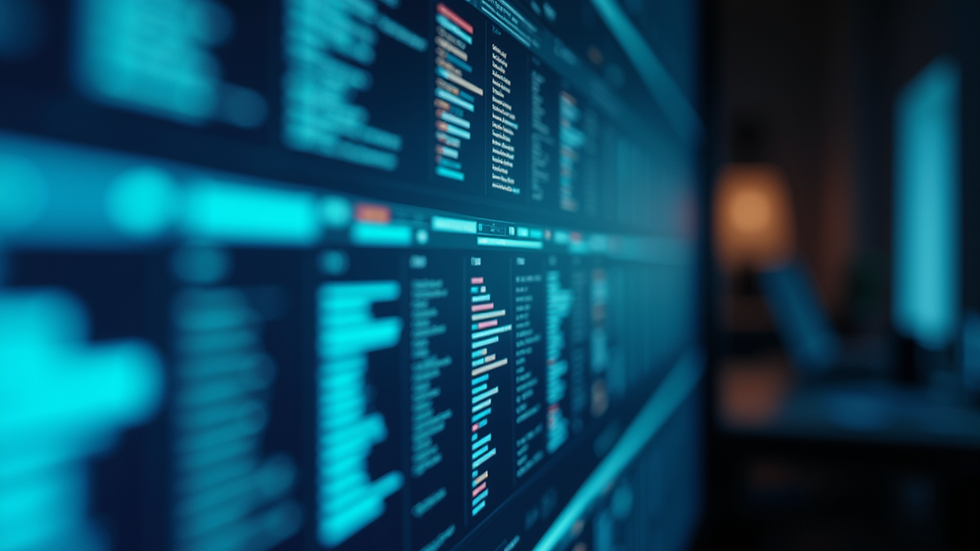Exploring Emerging Innovations Shaping the Future of Computing Technologies
- Khaled Alharbi
- Jun 25
- 4 min read
Updated: Jun 28
Computing technology is changing faster than ever, impacting how we live, work, and connect with others. We're on the brink of a new age in computing, where innovative technologies are setting the stage for immense transformation. In this post, we will explore some of the most thrilling developments in the computing world today.
Quantum Computing: The Next Frontier
Quantum computing introduces a groundbreaking way to process information using the principles of quantum mechanics. Traditional computers use bits, represented by 0s and 1s, as their basic units of data. In contrast, quantum computers use qubits, which can exist in multiple states at once. This enables them to tackle certain problems at speeds far exceeding those of classical computers.
For instance, Google reported that their 53-qubit quantum computer, Sycamore, achieved a computation task in 200 seconds that would take classical supercomputers approximately 10,000 years to complete. Industries like cryptography and drug discovery are harnessing quantum computing's power to revolutionize how they operate. As technology advances, its influence on computing and problem-solving will only grow.

Artificial Intelligence and Machine Learning Advancements
Artificial intelligence (AI) and machine learning (ML) are leading the charge in technological innovation. With the rise of large datasets and computing capabilities, AI and ML algorithms are becoming increasingly complex. Techniques like deep learning and natural language processing enable machines to learn from data effectively, resulting in significant breakthroughs in diverse fields.
In healthcare, AI algorithms can analyze medical images with up to 97% accuracy, improving diagnostic capabilities. Financial institutions harness AI for fraud detection, reducing false positives by about 50%, which translates to substantial savings. Moreover, generative AI has gained attention for creating unique content, from visual artwork to software code, showcasing its immense creative potential.

Edge Computing: A Shift Towards Decentralization
With the explosion of Internet of Things (IoT) devices, data generation has reached staggering levels. Edge computing provides a solution by processing data near its source, minimizing the need for centralized data centers. This approach greatly reduces latency and bandwidth usage, ensuring faster and more efficient operations.
For example, real-time data processing in smart cities can lead to improved traffic management, reducing congestion by 30%. Autonomous vehicles can make faster decisions, enhancing safety and performance. As organizations seek to leverage data from interconnected devices, edge computing plays an essential role in modern computing architecture.

Blockchain Technology: Beyond Cryptocurrency
Blockchain technology became well-known as the foundation of cryptocurrencies, but its applications span much wider. A decentralized ledger enhances security, transparency, and trust across various sectors, from supply chain management to healthcare and finance.
For instance, businesses employing blockchain in supply chains can ensure product authenticity, reducing counterfeit goods by 90%. Additionally, smart contracts can automate processes, leading to efficiency gains of up to 30%. As this technology matures, its significance across different industries will only increase.
Augmented and Virtual Reality: Bridging Digital and Physical Worlds
Augmented reality (AR) and virtual reality (VR) technologies are developing quickly, creating new opportunities in gaming, education, and healthcare. AR overlays digital information on the real world, enhancing user experiences, while VR immerses users in entirely digital environments.
In education, VR can facilitate immersive learning, enabling students to explore historical sites or conduct virtual science experiments from their classrooms. Companies use AR for training simulations, leading to a 70% reduction in training time. As these technologies become more accessible, they have the potential to reshape our interactions with both digital and physical worlds.
5G Technology: Enabling Seamless Connectivity
The introduction of 5G technology is transforming device communication, offering faster data transfers and lower latency. This next generation of wireless technology is essential for unlocking the full potential of IoT, AI, and autonomous systems.
With 5G, smart cities can operate more efficiently. For example, enhanced connectivity allows devices in traffic management systems to communicate in real-time, potentially reducing traffic delays by over 20%. This impact extends beyond telecommunications, creating numerous opportunities for innovation across various industries.
The Future of Computing: Cybersecurity Innovations
As technology advances, cybersecurity remains a pressing concern. Innovations in this field are emerging to combat rising threats. Machine learning and AI are pivotal in strengthening security measures, allowing systems to detect potential threats in real-time.
Furthermore, organizations are adopting a proactive approach to cybersecurity. Strategies like zero trust architecture are gaining popularity, ensuring only verified users and devices have access to critical systems. With statistics revealing that data breaches have increased by 33% in the last year, these innovations are vital for protecting user data and privacy.
Embracing Change in Computing Technologies
The world of computing technologies is evolving rapidly. Innovations like quantum computing, AI, edge computing, and blockchain are not only enhancing performance and efficiency but also improving security and usability.
As we explore these advancements, staying informed is crucial. Embracing these technologies can help individuals and organizations thrive in a fast-paced digital landscape, fostering a future full of opportunities and progress in the computing arena. The possibilities are vast, making this an exciting moment for those invested in technology.









Comments